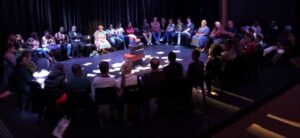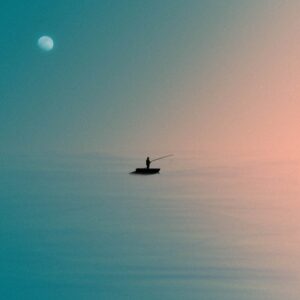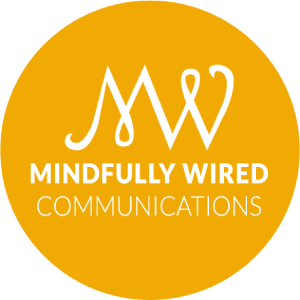LEARNING TO LISTEN
November 3rd, 2020
The arts and science are so often siloed from each other, when in reality pure magic can happen when the two meet. So when humanities graduate, Tesni Clare joined us at Mindfully Wired, our mission to fuse creativity with science suited her interdisciplinary thinking rather well. So well in fact, that she’s the perfect author for our latest blog; a thought-provoking journey through anthropology, science, creativity, and – simply – listening.
It’s a beautiful 5 minute read. Go on, treat yourself.
Three actors sit, encircled by an audience of eager ears. One, embellished with traditional Zulu sangoma attire, speaks softly of the healing power of the ocean, whilst another tells tales of her family history of seine net fishing. The audience hums with empathy: they are taken on a journey through storytelling. There are tears, laughter, anger. Memories, experiences and feelings are awoken.
Minutes later, the actors are joined by researchers, and a facilitated discussion begins between the audience – a local group of small-scale fishers, marine scientists, church followers, activists, aquarium educators, healers and more. This is Lalela uLwandle (Listen to the Sea) – a research and stakeholder-engagement project that was carried out along the coast of South Africa in 2019.
Following a proposal for oil and gas mining along the coastline that left the community feeling unheard, the project aimed to reveal local tensions surrounding mining and coastal change more broadly, and engage the community in a decision-making process.

A theatre performance to bring about collective decision-making? I hear you say. Let me elaborate.
As a naturally inquisitive person, who has never been able to choose between the sciences and the arts, I have long felt unsatisfied when ‘the environment’ is written and spoken about in an empty, myopic way. ‘Two degrees warming’. ‘Thirty percent extinction rate by mid-century.’ ‘A mineral-rich landscape’. Something vital and visceral is missing from these narratives, and it took a lot of soul-searching, dabbling in poetry and finally a full-blown Humanities degree for me to understand what.
The thing is, when it comes to the ‘environment’, climate change, biodiversity loss and resource use, we are all deeply affected in different ways, and it takes multiple perspectives to disentangle what these changes actually mean to us.
We have an unsavoury habit within policy, academia and the workplace of putting things in boxes. Artists, natural scientists, anthropologists and poets are often siloed into distinct corners of the universe, and disciplinary boundaries are forbidden to be crossed, for fear of contamination. But whilst statistics play an incredibly important role in laying down the facts, they do not necessarily tap in to our emotional realms, nor do they attend to our everyday lives. (Although, don’t get me wrong, there are some of us at Mindfully Wired for whom an excel spreadsheet is a spiritual shrine).
You see, us humans are natural story-tellers and natural story-listeners. Since time immemorial, we have made sense of the world through myths and stories, handed down through generations – and by ‘myths’ and ‘stories’, I don’t mean ‘lies’. I mean belief systems, value systems and knowledges. The individual and collective narratives that shape how we act in the world.
If there’s one thing a Humanities degree taught me, it’s that knowledge varies from place to place, from culture to culture, and from person to person. Let me paint a simple picture.

To an economist, the ocean may represent an investment opportunity, or a ‘unit’ of natural capital, performing multiple ‘ecosystem services’ for which a rough monetary value can be estimated. To a fisherman, the ocean is livelihood and experience, rising at dawn, casting lines and hauling in nets; whilst to a sailor, the ocean is a navigational universe of nautical miles, an intricate lattice of longitude and latitude, trade winds, and starboard tacks. To an artist or writer, the ocean is colour, energy, inspiration: a tapestry of stories.
To a marine biologist, the ocean is a complex, interdependent ecosystem, home to thousands of biota. To the Bajau people, however, the ocean is home to ancestral spirits who control the availability of fish, and must be treated with reverence. For some of us, we are ableto relate to all of these perspectives.
There is more than one way of ‘knowing’ the ocean. There are endless worldviews to learn from. As a Communications agency working for a broad spectrum of clients, from fishermen to artists to EU diplomats, understanding this is invaluable.
The ocean is a contested and changing place. It often feels that climate change, conservation, economic development and the preservation of livelihoods are pitched against one another. It is therefore essential to try and understand various peoples’ worldviews, if we are to make inclusive, collective decisions. This is where Humanities subjects like anthropology and social science can play a role – and yes, theatre is a research methodology. These creative, participatory projects can help to broach difficult, divisive topics – such as Marine Protected Areas – in ways that are inclusive and attentive to our values and beliefs. An exercise in listening, might I say.
So when I read the tagline on Mindfully Wired’s website, ‘mixing creativity with science to tell a new story of sustainability’, I knew I had found my place. Here, ideas sit alongside illustrations. Facts sit alongside feelings. Stories sit alongside science.
Do you agree that theatre and the arts can help to improve people’s understanding of controversial and divisive topics? How would you like to see them brought to life? Let us know in the comments.
